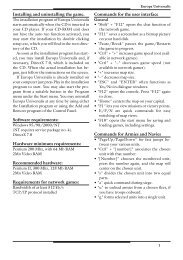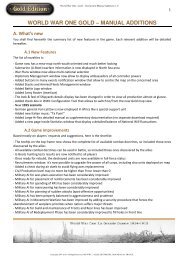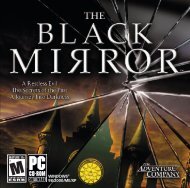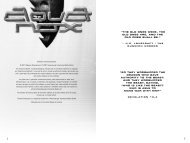Create successful ePaper yourself
Turn your PDF publications into a flip-book with our unique Google optimized e-Paper software.
11.4.1 Units in the HQ Reserve<br />
Breakthroughs occur at the end of all the activated Armies’ battles carried<br />
out after all of the retreats.<br />
The Attacker may draw on a number of units from the HQ Reserves to do<br />
a breakthrough, equal to maximum to the general’s Breakthrough value.<br />
11.4.2 Choices offered to the Attacker<br />
There are two types of breakthroughs:<br />
● Flank Breakthrough: it is an attack inside another region on the front,<br />
adjacent to one of the Attacker’s departure regions and of the<br />
conquered region. In this case, the Attacker automatically benefits<br />
from a “flank attack” bonus (+1/+2 in attack value). He may reuse his<br />
artillery.<br />
● In Depth Breakthrough: this is an advance or attack at a distance of 1<br />
region beyond the conquered region, far from the departure region.<br />
The advance may even be at 2 regions with cavalry in Good<br />
weather** if the 1st region of the Breakthrough is Plain.<br />
** The Russian cavalry may breakthrough 2 regions in Snow also.<br />
The Attacker may try both forms of breakthrough if he uses several reserve<br />
units.<br />
Important: breakthrough units are authorized to attack units having<br />
already engaged in battle. The Attacker may only attack with his<br />
breakthrough units (+ reinforcements from his HQ reserve). The GHQ<br />
cannot send reinforcements.<br />
During a breakthrough, it is entirely<br />
possible to besiege a fortress, carry out<br />
siege firings, and even launch an assault.<br />
On the other hand, no breakthrough may<br />
begin in a region containing an enemy<br />
fortress, even if it has been taken in<br />
assault or has been recaptured.<br />
11.4.3 Enemy Reaction to<br />
Breakthroughs<br />
The Opponent may intercept units<br />
carrying out a breakthrough, with stacks<br />
that have not engaged any battle during<br />
the activation of the current player’s<br />
Armies.<br />
If breakthrough units enter into a region<br />
containing beaten enemy units (those<br />
that have just retreated during the current<br />
set of battles), these units are obliged<br />
to retreat one more region to allow the<br />
breakthrough units to take the region.<br />
● The same for the 2nd breakthrough movement by the cavalry.<br />
● Each opposing stack that just retreated is also Shaken.<br />
● Exceptions, the beaten stack is not required to flee if it has withdrawn<br />
into:<br />
- a city (not a town)<br />
- a region with a friendly fortress<br />
- across a major river (not minor river), strait or canal.<br />
● In the case of battle, this beaten stack may either fight again normally<br />
or flee (owner’s choice).<br />
11.4.4 End of the Breakthrough<br />
A battle resulting from a breakthrough may never create a new<br />
breakthrough, in turn.<br />
11.4.5 Counter-Attacks<br />
If the defender is victorious, he may undertake a counter-attack in order to<br />
continue the battle. In such an instance, the attacker retreats to the area it<br />
entered the battle from, and the defender pursues him there. The battle<br />
takes place inside that “new” area.<br />
● Roles of attacker/defender are thus reversed, and units still in reserve<br />
may be called by both sides.<br />
● The former attacker does not have the benefit of terrain, except in<br />
mountains, behind major rivers or in a city.<br />
● If the former defender is victorious, he is not allowed to breakthrough<br />
from its counter-attack.<br />
● If the former defender is defeated, he retreats into the area he came<br />
from (i.e. the area where the original battle took place).<br />
World War One: La Grande Guerre 1914-1918 49
















